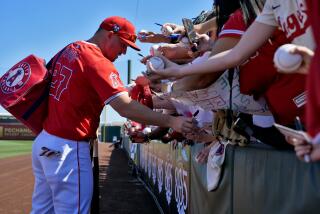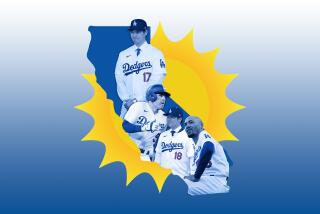On Paper, the Angels Are Butt of Statistical Jokes
- Share via
Seymour Siwoff and the Three Hirdts (for the record, that’s Steve, Tom and Peter) are baseball stat freaks of the oddest kind. They have a sense of a humor, and they can see the forest for the trees that are slaughtered for the purpose of tabulating Batting Average Against Fly-Ball Pitchers and Late-Inning Pressure Performance With Runners In Scoring Position.
Once again, their annual labor of love, The Elias Baseball Analyst, is on the stands and once again, they use their numbers to skewer, tweak, amuse, abuse and crunch the reputations of those who need the most crunching.
Sooner or later, they get around to almost everybody, but for our purposes today, we focus on their takes on the Angels--and if ever a team needed to be statistically analyzed with a sense of humor, it’s this one.
The comments in quotes belong to Seymour and the boys. As always, we get in the last word, in italics.
Dick Schofield: “Batting average vs. left-handed pitchers was 2d lowest in the league . . . He has driven in only 47 percent of runners from third base with less than two outs during his career, the 3d-lowest rate of any active player (minimum: 150 opportunities) . . . Bad news: His home-run output has dropped in every season since his career high of 13 in 1986. Worse news: No player has had a longer streak since Curt Blefary (1967-72). Good news: Scho can’t go any lower.”
That explains Gary DiSarcina.
Lance Parrish: “Batting average in road games was 6th lowest in the league . . . Batting average in Late-Inning Pressure Situations was lowest in the majors . . . He’s hit for a lower average in Late-Inning Pressure Situations than he has in other at-bats in each of the last eight years.”
That explains John Orton.
Von Hayes: “Became the first player in major league history with at least 250 at-bats and no home runs coming off a season of more than 10 homers. (Hayes hit 17 in 1990.) . . . Carries westward a streak of 336 consecutive at-bats without a home run . . . Four fewer players will need first initials on their uniforms as a result of the Kyle Abbott-for-Von Hayes deal.”
So, it was good for something. A trade that helped both seamstresses.
Hubie Brooks: “Slipped to a career low in batting average and hits. Batting average with runners in scoring position, always a strength, was also a career low. Batting average with runners on base was 3d lowest in league . . . Both Brooks and new teammate Von Hayes arrive in Anaheim with 139 career home runs to their credit. We say Hayes will be leading after the ’92 results are in.”
Says a lot for ol’ Hubie, doesn’t it?
Alvin Davis: “Both his home-run rate (one every 38.5 at-bats) and walk rate (one every 9.4 times up) were the worst of his career, as were his slugging average, on-base average and batting average, which was 50 points lower than his previous low-water mark (.271 in 1986). Oh, yes, and he struck out more frequently than ever: once every 6.8 trips to the plate . . . All things considered, Davis’ season represented a 13,300-to-1 breakdown, the most extreme by a player this young (30 at season’s end) in nearly 90 years--that’s right, since the great Ossee Schreckengost Breakdown of 1904.”
He was the only free-agent hitter not to snub the Angels this winter. It’s tough to say no when there’s nowhere else to go.
Gary Gaetti: “During three-year period, 1986-88, batted .280 with one homer every 17.7 at-bats; over last three years has batted .241 with a homer every 31.4 at-bats. That’s like going from three years’ worth of Willie Stargell production to three years of Bill Nahorodny.”
Still, that’s better than three years of Jack Howell.
Luis Polonia: “Played more innings in left field than any other player in the A.L. last season (1,249 2/3). (Now there’s a scary thought.)”
Our sentiments exactly. Luis was born to DH, but instead of finding a new left fielder, the Angels bring in the new Chili Davis (Alvin Davis) and the new Dave Parker (Hubie Brooks). Alas, poor Luis is left, alone and unarmed, in left.
Luis Sojo: “Batted .277 in road games but only .239 at home last season. Differences like that must have been a frequent topic of chat on Angels’ charter flights last year: Five of his teammates--Dave Gallagher, Donnie Hill, Wally Joyner, Luis Polonia and Davie Winfield--also hit at least 35 points higher on the road than at home.”
Which led to another frequent topic of chat among Gallagher, Hill, Joyner and Winfield: Let’s find a new home.
Chuck Finley: “Became the third Angels pitcher to win at least 16 games in three consecutive seasons. The others: Clyde Wright (1970-72) and Nolan Ryan (1972-74). . . . Career winning percentage of .569 (66-50) is highest in Angels history (minimum: 50 decisions). . . . (Since September 1987) has more wins than any other A.L. pitcher except Stewart, Clemens and Welch . . . Left-handed batters drove in only eight runs against Finley last season, four on solo home runs.”
The difference between the Angels and 100 losses in 1992? One toe.
Mark Langston: “Had a record of only 3-4 in his seven complete games . . . The Angels were the only team in the majors that had a losing record in games in which their starter went all the way (8-10).”
Credit the Angel offense. And that was with Wally Joyner and Dave Winfield.
Bryan Harvey: “He walked 6.71 batters per nine innings in 1989, lowered that to 4.90 in 1990, and then posted a mark of 1.94 last season. His decline of 2.95 walks per nine last season was the largest by a relief pitcher since 1975, when Gene Garber dropped his rate from 5.21 to 2.21 . . . Only three players in major league history have a career average of more than 10 strikeouts per nine innings (minimum: 200 IP): Rob Dibble (12.22), Harvey (10.68) and Tom Henke (10.30).”
No such thing as a $15.5-million bargain? There is now.
Don Robinson: “Has been on the disabled list eight times in his major league career, but was the only pitcher to throw at least 100 innings for the Giants in each of the last four seasons. Too bad they were expecting 200.”
In other words, keep Bert Blyleven loose.
More to Read
Go beyond the scoreboard
Get the latest on L.A.'s teams in the daily Sports Report newsletter.
You may occasionally receive promotional content from the Los Angeles Times.






